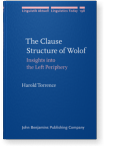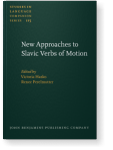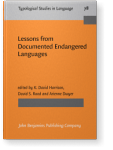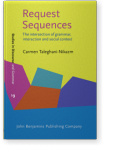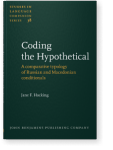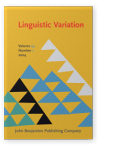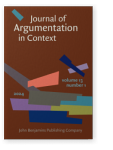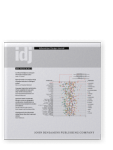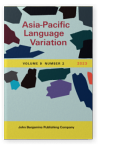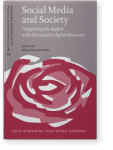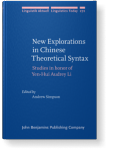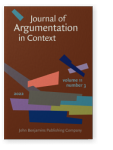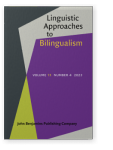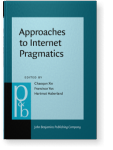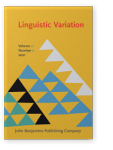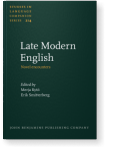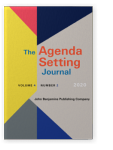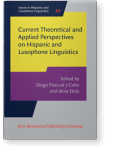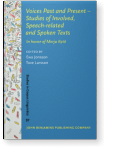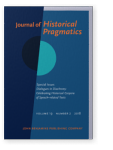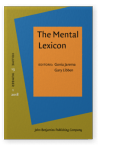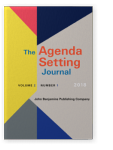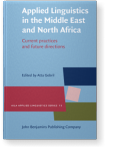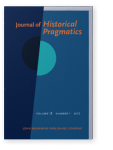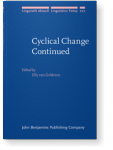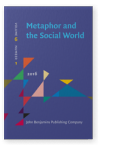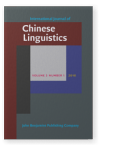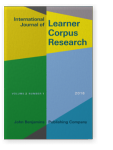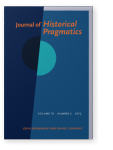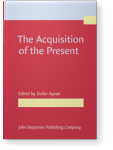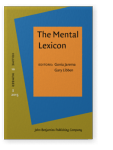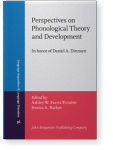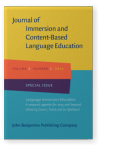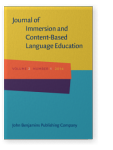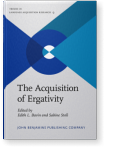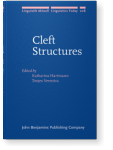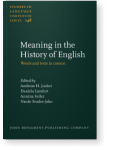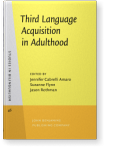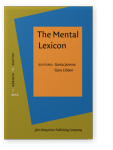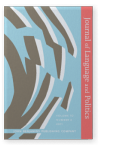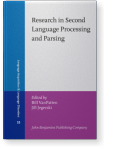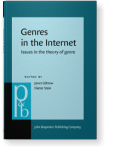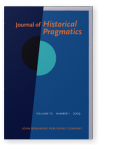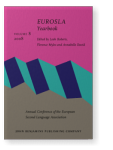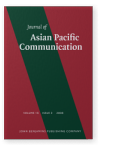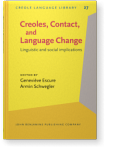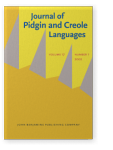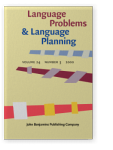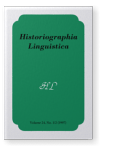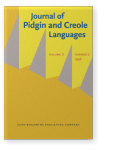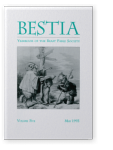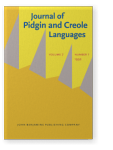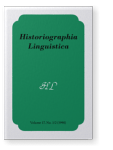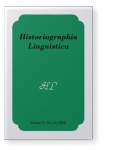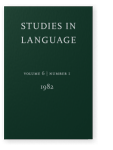University of Kansas
List of John Benjamins publications for which someone affiliated with University of Kansas plays a role.
Testifying to Language and Life in Early Modern England: Including a CD-ROM containing An Electronic Text Edition of Depositions 1560–1760 (ETED)
Merja Kytö, Peter J. Grund & Terry Walker
2011. xxi, 360 pp. (Incl. CD-Rom) | monographSubjects Corpus linguistics | Discourse studies | English linguistics | Forensic & legal linguistics | Historical linguistics | Pragmatics
New Approaches to Slavic Verbs of Motion
Edited by Victoria Hasko & Renee Perelmutter
[Studies in Language Companion Series, 115] 2010. x, 392 pp. | edited volumeSubjects Balto-Slavic linguistics | Semantics | Syntax | Theoretical linguistics | Typology
Lessons from Documented Endangered Languages
Edited by K. David Harrison, David S. Rood & Arienne Dwyer
[Typological Studies in Language, 78] 2008. vi, 375 pp. | edited volumeSubjects Theoretical linguistics | Typology
Request Sequences: The intersection of grammar, interaction and social context
Carmen Taleghani-Nikazm
[Studies in Discourse and Grammar, 19] 2006. x, 125 pp. | monographSubjects Discourse studies | English linguistics | Germanic linguistics | Pragmatics | Syntax
Coding the Hypothetical: A comparative typology of Russian and Macedonian conditionals
Jane F. Hacking
[Studies in Language Companion Series, 38] 1998. vi, 156 pp. | monographSubjects Balto-Slavic linguistics | Semantics | Syntax | Typology
2024 Indeterminate pronouns in Kaqchikel
Keywords wh-question | relative clause | negative indefinite | free relative clause
2024 The convergence of public sphere and state advocacy: A case study of the Qing Lang movement in China’s entertainment industry
Keywords Chinese entertainment industry | Chinese public sphere | public argument | Qing Lang | reciprocal model | social movement advocacy
2023 Language independent optimization of text readability formulas with deep reinforcement learning
Keywords text readability | deep reinforcement learning | parameter optimization
2024 Variation in the Fataluku voiced coronal (j)
Keywords Fataluku | Timor-Leste | East Timor | Lautém | variation in minority languages | Boruta | random forests | classification trees | geographical variation | sociophonetics | language documentation
2023 Cultivating contexts for deliberative argumentation
Keywords deliberation | normative pragmatics | feminism | Adrienne Rich | Audre Lorde
2021 The use of default forms in codeswitching: Mood selection in Spanish
Keywords codeswitching | subjunctive | Spanish-English bilingualism | heritage | default forms
2021 Online nicks, impoliteness, and Jewish identity in Israeli Russian conflict
discourse
In: Approaches to Internet Pragmatics: Theory and practice[Pragmatics & Beyond New Series, 318] pp. 235–256
Keywords conflict discourse | impoliteness | facework | inappropriate identity markers | migration | Jewish | Israeli | Russian | identity | nicknames | online discourse
2021 Gradability across grammatical domains
Keywords semantics | gradability | gradable predicates | modality | Bantu
2020 Deepening the concept of ‘compelling arguments’: Linking substantive and affective dimensions of attributes in assessing the effects of climate change news on public
opinion
Keywords climate change | agenda setting | compelling arguments | substantive attribute | affective attributes
2020 Rendering the untellable, tellable: The cooperative work of face in conversational storytelling
Keywords face | face work | cooperation | Goffman | conversation analysis | conversational storytelling | girl talk | non-native speaker | tellability | Schegloff
2020 The effect of grammatical person on subject pronoun expression in the oral narratives of Spanish second language learners
In: Current Theoretical and Applied Perspectives on Hispanic and Lusophone Linguistics[Issues in Hispanic and Lusophone Linguistics, 27] p. 85
Keywords Spanish second language acquisition | subject pronoun expression | null subject parameter | variationist second language acquisition
2020 Saying, crying, replying, and continuing: Speech reporting expressions in Early Modern English
In: Voices Past and Present - Studies of Involved, Speech-related and Spoken Texts: In honor of Merja Kytö[Studies in Corpus Linguistics, 97] pp. 63–78
Keywords speech representation verbs | direct speech | Early Modern English fiction | semantic-functional categories | word order
2020 Neural evidence for the processing of referential ambiguity and referential failure in Spanish
In: Current Theoretical and Applied Perspectives on Hispanic and Lusophone Linguistics[Issues in Hispanic and Lusophone Linguistics, 27] pp. 153–174
Keywords anaphora | pronouns | Spanish | ERPs | individual differences
2019 Beyond speech representation: Describing and evaluating speech in Early Modern English prose fiction
Keywords
A Corpus of English Dialogues 1560–1760 (CED) | Early Modern English | prose fiction | speech descriptors | speech representation
2018 The influence of phoneme inventory on elicited speech errors in Arabic speakers of English
Keywords speech production | speech errors | tongue twister | Arabic | phoneme inventory
2018 Media vs. reality: Who sets the public agenda on health?
Keywords agenda setting | health communication | health journalism
2017 When the president loses his voice, the people capture speech
In: Applied Linguistics in the Middle East and North Africa: Current Practices and Future Directions[AILA Applied Linguistics Series, 15] pp. 11–35
Keywords theory of practice | language and ideology | discourse analysis | diglossia | political discourse in the Arab world | Tunisian Revolution
2017 Effects of providing explicit negative evidence on students’ perception of ungrammatical sentences using –le
Keywords negative evidence | teaching interference | Chinese aspect marker -le
| 明确的反面证据 | 教学干扰 | 中文体标记 “了”
2017 “Speaking base approbious words”: Speech representation in Early Modern English witness depositions
Keywords Early Modern English | speech representation | witness depositions
2016 Follow this path: Conceptual metaphors in writing center online consultations
Keywords online writing instruction | deliberateness | tutoring | writing center | conceptual metaphors
2016 Pattern substitution in Wuxi tone sandhi and its implication for phonological learning
Keywords Maximum Entropy grammar | Tone Sandhi | opacity | Wuxi | productivity
2016 The Kansas Developmental Learner corpus (KANDEL): A developmental corpus of learner German
Keywords beginning and intermediate L2 proficiency | inter-annotator agreement | error annotation | longitudinal learner corpus | L2 German | written corpus
2016 Electrifying the lexical decision: Examining a P3 ERP component reflecting early lexical categorization
Keywords lexical processing | P3 component | lexicality | lexical decision | event-related potentials (ERP) | oddball task
2014
Examining the impact of task demands on morphological variability in native and non-native Spanish*
Keywords L2 Spanish | L2 morphological variability | gender and number agreement | markedness | task demands | default morphology.
2014 Classroom interaction in one-way, two-way, and indigenous immersion contexts
Keywords corrective feedback | immersion education | equity in interaction | classroom interaction | indigenous language revitalization
2014 Language ideologies and Cherokee revitalization: Impracticality, legitimacy, and hope
Keywords critical ethnography | language immersion | language ideologies | indigenous language revitalization
2013
Examining second language development using event-related potentials: A cross-sectional study on the processing of gender and number agreement
Keywords Event-related potentials | second language acquisition | second language processing | agreement | gender | number | transfer | structural distance
2012 The recruitment of knowledge regarding plurality and compound formation during language comprehension
Keywords compounding | morphological constraints | ambiguity | parsing | inflection
2011 Bleaching a dialectal voice in political discourse: Sociolinguistic choices in re-writing political speeches
Keywords and language ideology | Arab political discourse | diglossia | bilingualism | linguistics practices | sociolinguistic choices
2009 Pragmatic functions of reported speech with jako in the Old Russian Primary Chronicle
Keywords jako recitativum | Russian Primary Chronicle | reported speech | indirect speech | Old Russian | direct speech | evidentiality
2008 Taiwanese older adults’ perceptions of aging and communication with peers and young adults
Keywords age identity | intergenerational communication | filial piety | Taiwan
